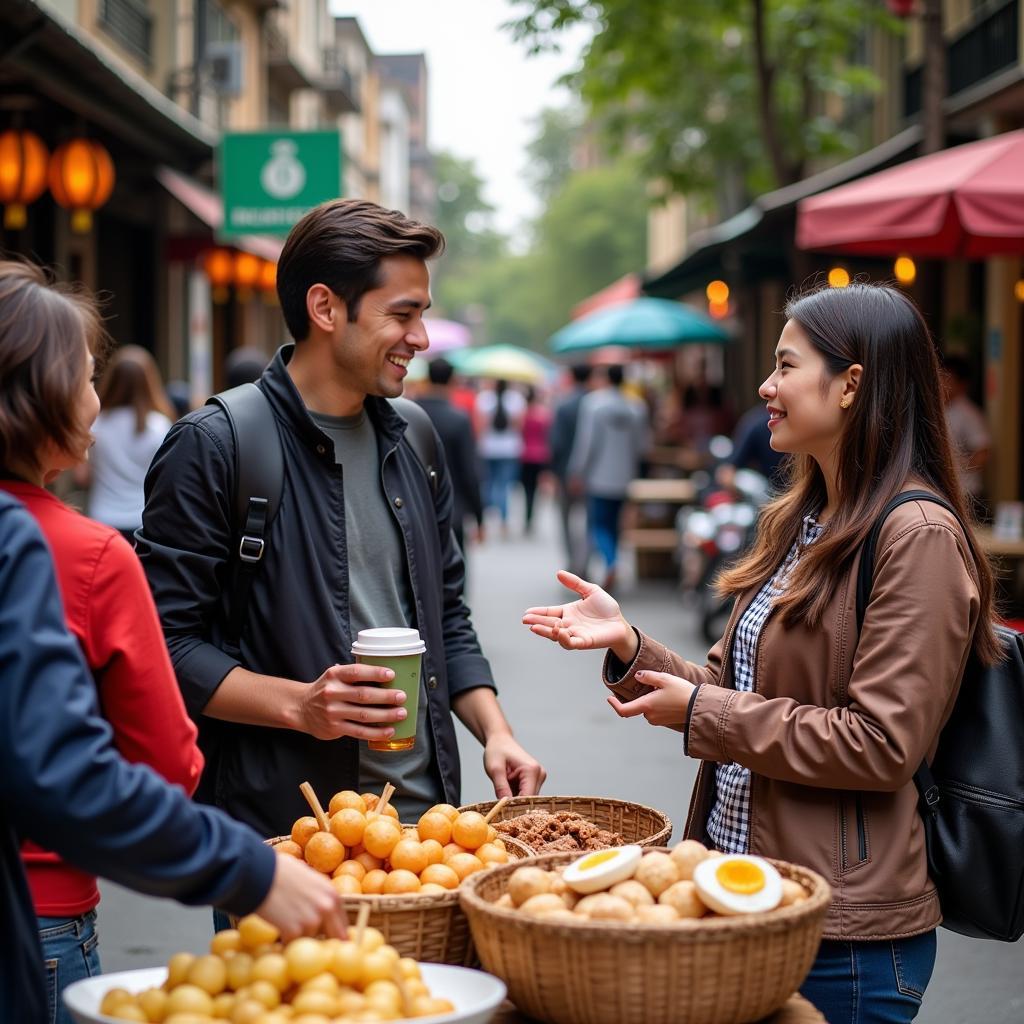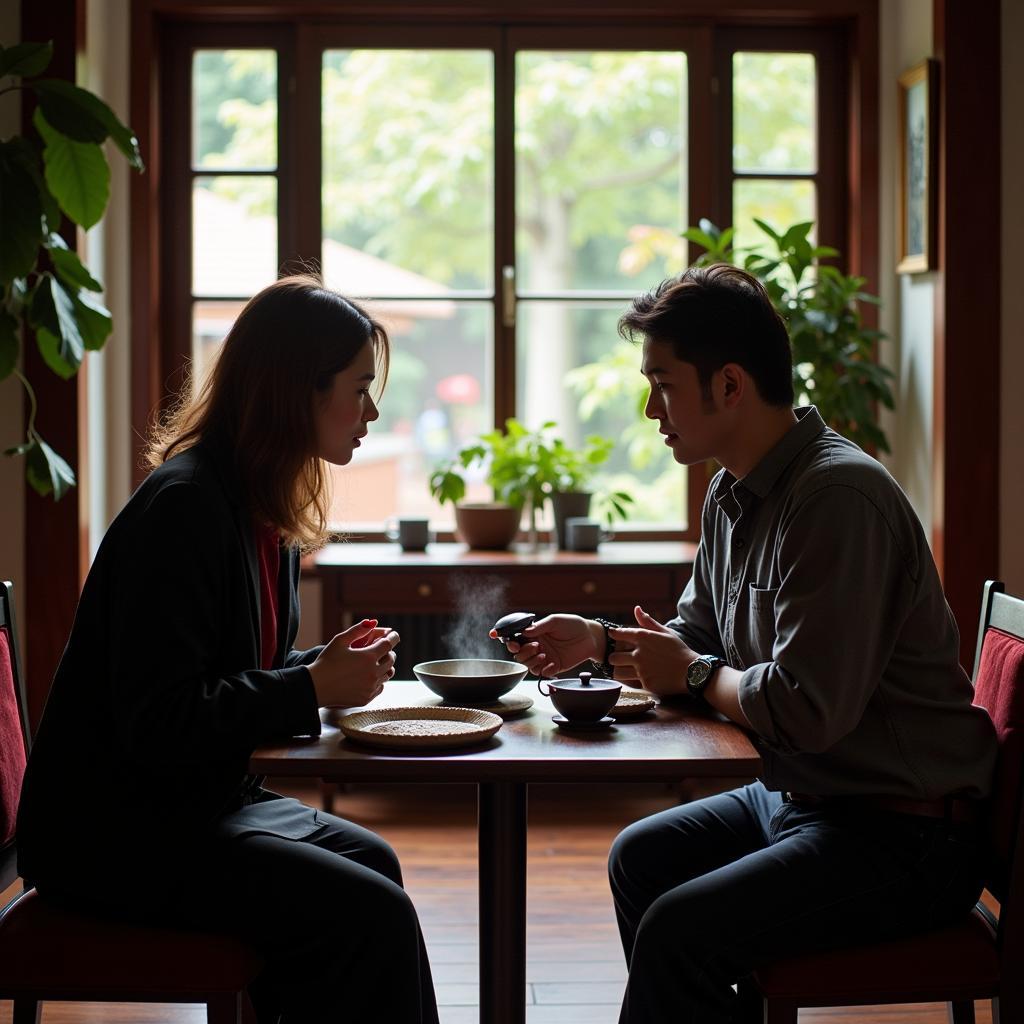Tactful conversation is essential for navigating social situations gracefully, especially in a culturally rich city like Hanoi. This guide provides practical tips and insights to help you communicate effectively and respectfully with locals, fostering positive interactions and enriching your travel experience.
Understanding the Nuances of Vietnamese Communication
Vietnamese culture emphasizes politeness and respect. Indirect communication is often preferred to avoid confrontation or causing embarrassment. Understanding this cultural context is key to mastering tactful conversation. For example, instead of directly saying “no,” a Vietnamese person might say “maybe” or “let me think about it.” This doesn’t necessarily mean they’ll agree, but rather, they’re trying to decline politely.
 A tourist engages in polite conversation with a street vendor in Hanoi's Old Quarter
A tourist engages in polite conversation with a street vendor in Hanoi's Old Quarter
Mastering the Art of Polite Language
Using polite language is crucial. Addressing people with appropriate titles like “Anh” (older brother) or “Chi” (older sister) for someone slightly older than you, and “Ông” (Mr.) or “Bà” (Mrs.) for older individuals shows respect. Learning a few basic Vietnamese phrases like “Xin chào” (hello), “Cảm ơn” (thank you), and “Không có gì” (you’re welcome) can go a long way in building rapport.
Active Listening and Nonverbal Cues
Active listening is a cornerstone of tactful conversation. Pay attention to what others are saying, both verbally and nonverbally. Maintaining eye contact, nodding, and offering verbal affirmations show that you’re engaged and respectful. Be mindful of your body language, as it can communicate volumes even without words. Avoid gestures that might be considered rude or offensive in Vietnamese culture.
 Two individuals participate in a traditional Vietnamese tea ceremony, demonstrating active listening and respectful communication
Two individuals participate in a traditional Vietnamese tea ceremony, demonstrating active listening and respectful communication
Navigating Sensitive Topics
Certain topics, such as politics or religion, can be sensitive in Vietnamese culture. While it’s okay to express your own views respectfully, avoid imposing them on others or engaging in heated debates. Instead, focus on finding common ground and building bridges of understanding through shared experiences and interests.
Tactful Conversation in Business Settings
In business interactions, maintaining professionalism and respect is paramount. Dress appropriately, arrive on time, and address people using their formal titles. Be mindful of hierarchical structures and show deference to senior members. Tactful negotiation involves listening carefully, understanding the other party’s perspective, and finding mutually beneficial solutions.
 Business professionals engage in a tactful conversation during a meeting in a modern Hanoi office
Business professionals engage in a tactful conversation during a meeting in a modern Hanoi office
Conclusion
Mastering tactful conversation in Hanoi is about more than just knowing the right words; it’s about understanding and respecting the cultural context. By practicing active listening, using polite language, and being mindful of sensitive topics, you can build stronger connections with locals, enhance your travel experience, and gain a deeper appreciation for the rich cultural tapestry of Hanoi. Remember, tactful conversation opens doors to meaningful interactions and unforgettable memories.
FAQ
- What are some common polite phrases in Vietnamese? “Xin chào” (hello), “Cảm ơn” (thank you), “Không có gì” (you’re welcome).
- How should I address older people in Vietnam? Use titles like “Anh” (older brother), “Chi” (older sister), “Ông” (Mr.), or “Bà” (Mrs.).
- What topics should I avoid discussing in Vietnam? Sensitive topics like politics or religion should be approached with caution.
- What is the importance of nonverbal communication in Vietnam? Nonverbal cues, like eye contact and body language, play a significant role in communication.
- How can I practice tactful conversation in business settings? Dress professionally, be punctual, use formal titles, and respect hierarchical structures.
Need support? Contact us at Phone: 0372960696, Email: TRAVELCAR[email protected], or visit us at 260 Cau Giay, Hanoi. We have a 24/7 customer service team.

